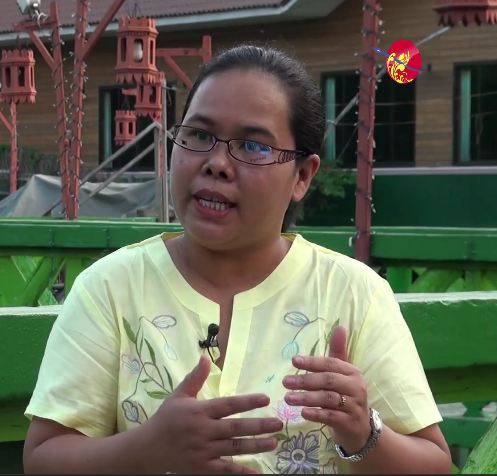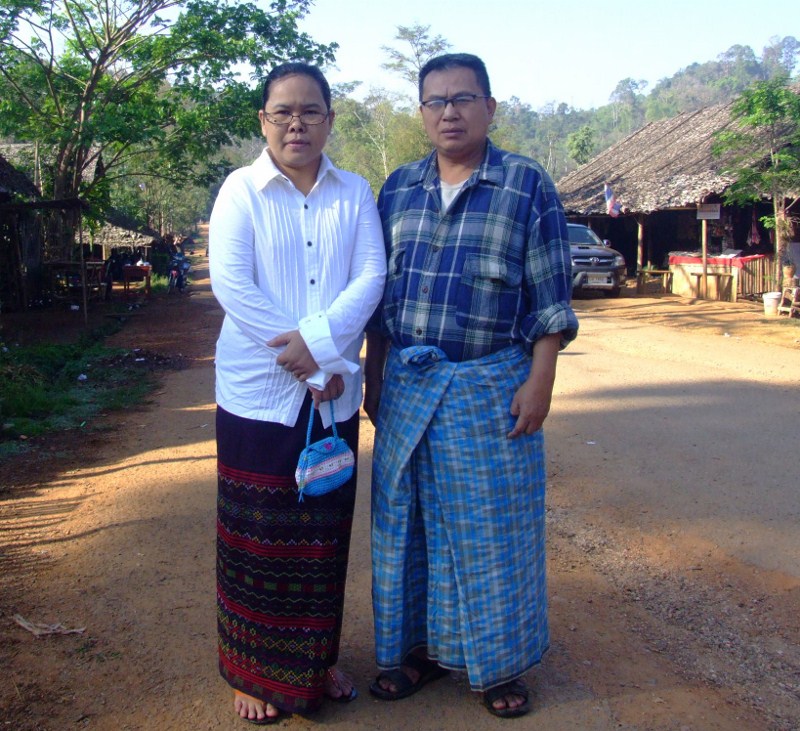Burmese Writer Hnin Pan Ein Speaks about a Country of Heroes in the Dark
by Khet Mar / March 19, 2012 / No comments
I met Hnin Pan Ein three or four times when we were both in Burma. Even though we didn’t meet often, I liked her writing, which beautifully shows the struggling and suffering of the Burmese people through her own experiences. In 1998 her husband Ne Oo was sentenced to 14 years’ imprisonment for his political activities and sent to a remote prison. Ne Oo was released in 2005, but because he continued his political activities, he was forced to flee the country in early 2008.
After her husband fled, Hnin Pan Ein was harassed several times by the authorities. In 2008 she decided to follow her husband with her son to the Nupo refugee camp in Thailand. While there Hnin Pan Ein continued writing and in 2011, a series of radio stories she wrote were compiled and published as a book, entitled A Country of Heroes in the Dark. In this interview, conducted via email, Hnin Pan Ein details her life as a daughter and wife of political prisoners, explains the difficulties of being a writer under censorship, and gives her opinion on the condition of free speech in Burma.
You have lived both as a daughter and as a wife of political prisoners. Could you compare the experiences?
My mother and I looked for my father from when I was six months old until I turned three years old. We even looked in the old palace of Mandalay. I remember that was a very hot day, I was under a Pathein umbrella but my mother didn’t have one. When I became the wife of a political prisoner, I could sympathize with my mother’s feelings. I understood that the heat of the sun could not be compared with the heat of worry in our hearts. And despite all the difficulties, my mother remained calm and took care of me by selling traditional snacks. I could feel my father’s love in the letters he sent from CoCo island prison because my mother made me feel as if I were not far from my father. I was able to pass my time as a family member of a political prisoner because of my parents’ love.
As a mother, I also tried to relieve my son’s suffering. I had to struggle to survive and to support my husband. I don’t have words to explain how tiring it was. I visited my husband in prison as much as I could; it was my way of bringing part of the outside world to him.
And now, what is your experience in the Refugee Camp?
Out of all of my experiences, the life of the refugee is the worst. The refugee doesn’t even own their own future. They must depend on the host country (in my case, the host country is Thailand) and the United Nations Refugee Agency.
Refugees must only live in refugee camps. They are not allowed to work. Even the head of the family has no job. The wives must depend on their husbands, who have no jobs. The wives can only try to solve the daily problems with their mouths, because they can’t do it with their hands: We can talk and complain but we can’t act, so the sounds of arguing come out of the small huts in the refugee camp everyday. Even in the distressing things, there are some funny things. I wrote about these experiences as a refugee twice a week for three years for the online exile magazine Mizzima.
But writing in a refugee camp is not easy at all. What makes you continue your work?
Although my leaving Burma meant my parents’ tears, it also meant my life would be safe. That was the first time I’d seen my father cry. I still write because I want to fulfill my father´s dream: He wanted me to continue my career as a writer.
Another reason why I write in the camp is that the children who are born in refugee camps are stateless. I want them to know about our culture, literature, and traditions.
A Country of Heroes in the Dark, the book that you wrote in the refugee camp, details your experiences with helping the families of other political prisoners. You also helped the family members of military intelligence officers when they were put in prison. What did it mean to help people who followed and tortured your husband?
We are the ones who are moving against the current. We are called humanitarians because we try to show the truth with our lives. I knew about the military dictatorship and the people in the military system because of the environment I grew up in, but like all of us at the time, the military intelligence officers were in trouble because of the system we were in. I helped them because of my humanitarian mind.
Let’s talk about the writing process. How did you finish these stories in a place where it is almost impossible to find books, use the internet, and contact sources?
In the refugee camp where I live, there are over 30 former political prisoners who fled to Thailand to protect their lives. They told me about their experiences and their camaraderie and I had to rely on them.
Who were your biggest influences in your decision to become a writer?
The biggest influences in my decision to become a writer were my own life and the Burmese writer Ludu Daw Ama.
In 1998, my husband was moved from Insein prison in the former capital of Rangoon, to Kalay prison in the middle of Burma without any visit from our family. When I tried to visit my husband for the first time, the poet Tin Moe wrote a letter of introduction to Ludu Daw Ama. As soon as she read the letter she told me, “You should write. Your life is very good to share.”
I started writing because of her encouragement and won a first prize award for an article at a competition that celebrated democracy leader Aung San Suu Kyi’s birthday. Then I wrote for different magazines and won other awards.
Let’s talk about the effects of censorship. The Press Scrutiny and Registration Department censored your work many times. Is there an anecdote of this experience you want to share?
I wrote a short story about a boy. The boy in my story was asked “Have you had your dinner?” He replied, “Yes, I ate my breakfast in the morning as my lunch and my dinner.” It meant he just had one meal for the day. That quote was a main theme of the story and it was censored. We, the writers in Burma, had to put the main idea in marginal places to avoid being censored. We couldn’t put important sentences in the paragraph we wanted. We could only write in metaphors or with symbolism and had to write our works with caution instead of creativity.
For instance, if I wanted to write about my imprisoned husband, I should write that he was on a long journey. If I wanted to mention the people who lived with him in prison, I should talk about them as if they were his neighbors. Because I wrote in tricky ways like these, my husband said “Even I am confused.”
But when I visited him, even though I didn´t know if we would survive, I told him we were OK. When I wrote about this experience in one of my stories, I wrote that “I told him artificial words and artificial smiles when I saw him.” After he read my story he told me not to come and see him with those artificial words and smiles.
Since the new government has taken power, the Press Scrutiny and Registration Department has allowed the publication of some writings and books that weren’t allowed in the past. In an interview with Radio Free Asia, Tint Swe, Deputy Director-General of Burma’s Press Scrutiny and Registration Department said “Press censorship should be abolished in the near future.” Do you think the Press Scrutiny and Registration Department’s new policy is a real change?
My perception of this situation is that we, the people, are being pushed by force into the system of U Thein Sein’s government. The new government couldn’t declare a clear policy and attitude about the change. It is like the government is testing the people. We are very excited to talk about the little bit of freedom that we see now in this new governmental period because we have been living with no freedom. But if you write about the Kachin and Karen victims of the battles in eastern Burma when people are talking about the policy change in censorship, they won’t let you publish that news. Also, try and write criticisms about new government. You will see how they respond.
Now that you are in Thailand you can write without thinking about censorship. What is the importance of freedom of expression?
There are some political prisoners who have been in different prisons until now. Those political prisoners are telling the importance of freedom of expression with their lives. If I was in Burma, where there is censorship, I couldn’t write my book. Because I am in a place where I can express what I want, I can share my people who are calling for their freedom with my readers. We have been planning to publish A Country of Heroes in the Dark in English, but my strongest desire is to publish this book inside Burma.






